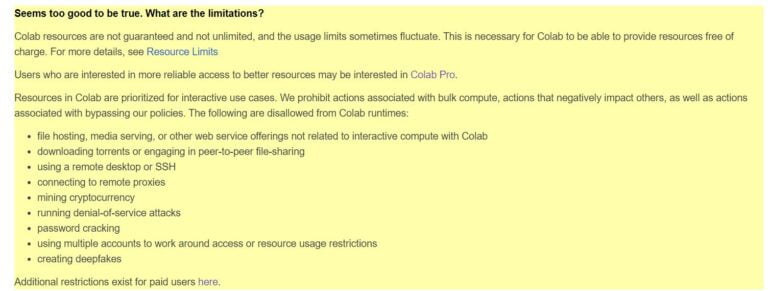Google bans deepfake training in Colab

Google bans deepfake training in its own cloud service Colab. What is the reason for this?
Thanks to free deepfake tools like DeepFaceLab, DeepFaceLive and FaceSwap, anyone with some technical know-how and powerful hardware can create their own deepfakes today. The tools and algorithms are constantly being improved and the knowledge gathered by the community helps beginners to achieve better results.
However, there is one major hurdle: For convincing deepfakes, you need sufficiently trained models.
The more training data and the higher the resolution, the larger the model becomes - and quickly exceeds the limits of the available video memory (VRAM) on graphics cards in conventional PCs. Users are therefore turning to GPUs in the cloud, which offer up to 80 gigabytes of VRAM.
Google Colab bans deepfake training
A cloud service often used for machine learning experiments is Google's Colab, an implementation of Jupyter notebook environments that enables remote training on cloud graphics cards from Nvidia.
In addition to various paid subscriptions that ensure access to GPUs such as Nvidia's A100, the service also offers free access that distributes remaining available resources among all users.

Until now, Colab could also be used to train deepfake algorithms from DeepFaceLab and FaceSwap. However, Google is now changing this for the free Colab version: The list of forbidden activities in the terms of use now also includes deepfake training in addition to DDOS attacks or the mining of cryptocurrencies.
Deepfake ban: FaceLab developer does not assume ethical motivation
The use of DeepFaceLab in Colab already triggers a warning, users report. According to this, the execution of the code can lead to a usage restriction by Google.
The code of FaceSwap does not generate a warning so far - however, the tool is also much less widespread. Matt Tora, co-developer of FaceSwap, assumes that the reason for the ban is not ethical. Rather, Colab is intended as a platform for AI researchers, not for mass and computationally intensive training of deepfake models.
"It saddens me that an avenue has been closed for people to experiment with our code, however, in terms of protecting this particular resource to ensure its availability to the actual target audience, I find it understandable," Tora said.

Google's ban removes what is arguably the best option for free deepfake training. It is not yet clear whether the restriction also applies to the "Pro" and "Pro+" variants of Colab.
At the bottom of the banned list, it simply states, "Additional restrictions exist for paid users." However, deepfakes do not appear in the list of restrictions for the Pro variants so far - cryptocurrencies or file sharing are explicitly mentioned twice there, though.
However, this will not stand in the way of the spread of increasingly better Deepfakes: Numerous cloud providers offer relatively cheap access to powerful GPUs. In our article about the history of Deepfakes you will learn more about their creation and possible future.
AI News Without the Hype – Curated by Humans
As a THE DECODER subscriber, you get ad-free reading, our weekly AI newsletter, the exclusive "AI Radar" Frontier Report 6× per year, access to comments, and our complete archive.
Subscribe nowAI news without the hype
Curated by humans.
- Over 20 percent launch discount.
- Read without distractions – no Google ads.
- Access to comments and community discussions.
- Weekly AI newsletter.
- 6 times a year: “AI Radar” – deep dives on key AI topics.
- Up to 25 % off on KI Pro online events.
- Access to our full ten-year archive.
- Get the latest AI news from The Decoder.